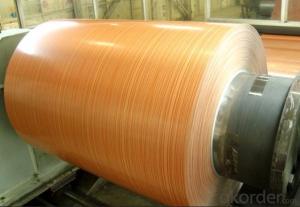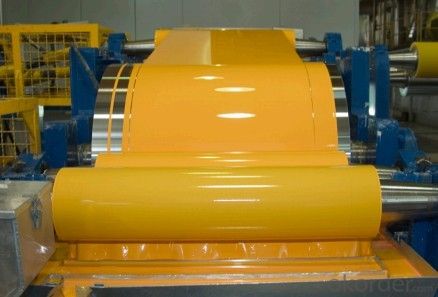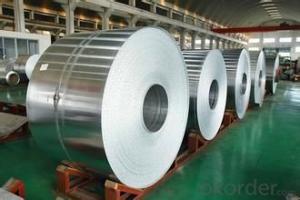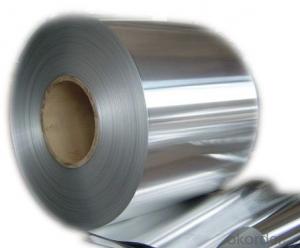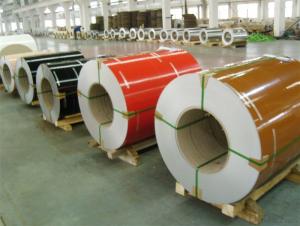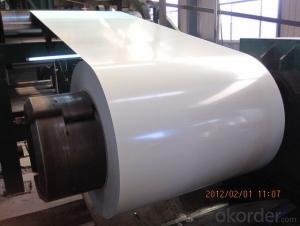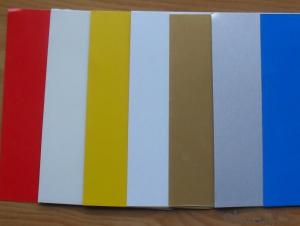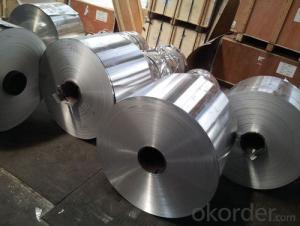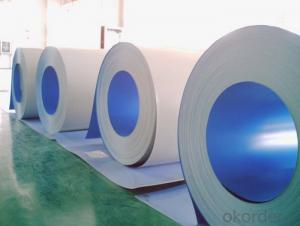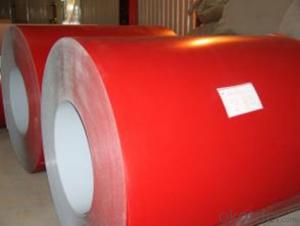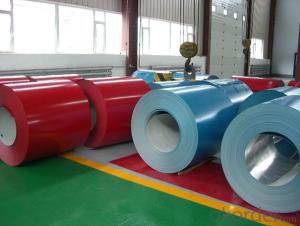Perforated Color Coated Aluminum Coil Aluminum Roll Temper H16
- Loading Port:
- Shanghai
- Payment Terms:
- TT or LC
- Min Order Qty:
- 2 m.t.
- Supply Capability:
- 60000 m.t./month
OKorder Service Pledge
OKorder Financial Service
You Might Also Like
Specification
Color Coated Aluminum Coil Aluminum Roll Temper H16
1. Grade
| Series: | 1100 etc. |
| Series: | 3003 3004 3005 etc. |
| Series: | 5006, 5052 |
| Series: | 8011 etc. |
2. Thickness
| Plate Thickness | 0.1mm, 0.12mm,0.15mm,0.20mm,0.25mm,0.28mm,0.3mm,0.35mm,0.38mm, 0.4mm,0.5mm, 0.53mm, 0.58mm,0.68mm,0.7omm,0.73mm,0.75mm, 0.90mm, 1mm, 1.2mm |
| Coil Thickness | 0.1mm, 0.12mm,0.15mm,0.20mm,0.25mm,0.28mm,0.3mm,0.35mm,0.38mm, 0.4mm,0.5mm, 0.53mm, 0.58mm,0.68mm,0.7omm,0.73mm,0.75mm, 0.90mm, 1mm, 1.2mm |
3. Description
Alloy | AA1100, 3003, 3004, 3105, 5006, 5052, 8011, etc , etc. |
Temper | H16, H18, H24, H26, H28 |
Thickness | From 0.1mm to 1.2mm |
Width | Standard width:1240mm, 1270MM |
Special width:1000mm, 1200mm, 1240mm, 1270mm, 1520mm, 1620mm | |
Diameter | Standard dia:1200mm |
Interior dia: 150mm,405mm, 500mm, 505mm, 510mm | |
outer diameter: 1200mm | |
Weight | 2.5 T/coil,3.0 T/coil |
Coating thickness | PE:>=16 micron , PVDF:>=25 micron |
Protective film | As per customer’s request |
Coating paint | PVDF, PE(Polyester), epoxy, polyamide, polyurethane |
Color | Soid, metallic, high gloss,stone,timber,brush,mirror,sparkling, RAL or by customer requirements. |
Weight | As per customer’s request |
| Surface | Embossed, mill finish, coated |
| Gloss | 10-100% |
| Coating Hardness (pencil resistance) | More than 2h |
| Coating adhesion | 1J |
| Impact Resistance | No peeling or cracking(50 kg/cm) |
| Application | ACP,wall cladding,facades,roofs and canopies,ceilings,signboards,blind window,display platforms,electrical panels,etc |
| Coating Thickness | PE coating:more than 16 micron |
| PVDF coating:more than 25micron |
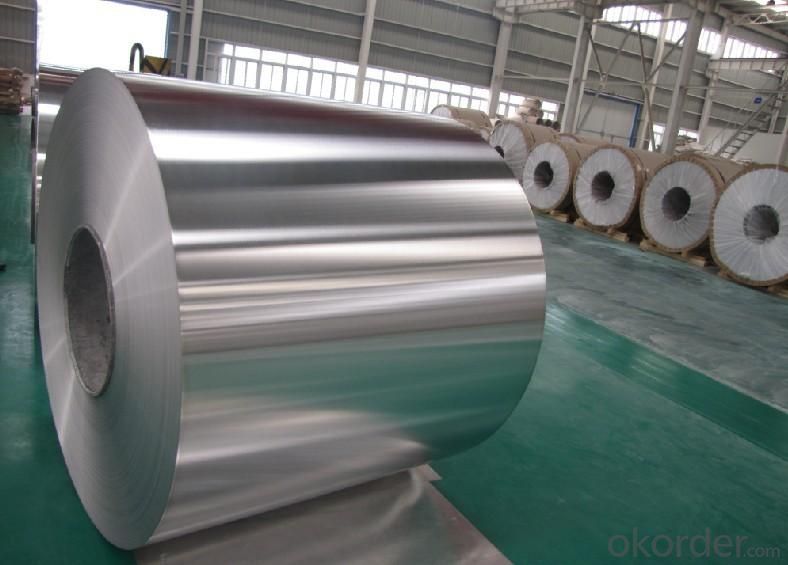
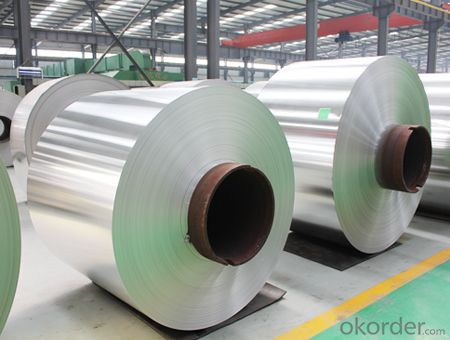
4. FAQ
Q: Can you provide free samples?
A: Yes, free samples will be sent to you on freight at destination.
Q: Can I get your latest catalogue?
A: Yes, it will be sent to you in no time.
Q: What is the MOQ?
A: 5 tons
Q: What are your payment terms?
A: We accept L/C, D/A, D/P, T/T, West Union, etc
- Q: What are the effects of casting temperature on ductility of aluminum coil?
- The tensile strength and ductility increase with the solid solution insulation time, and reach best fit at 1 hour. Continue thermal insulation, and the tensile strength will change little while the ductility will reduce. This is because the solid solution over insulation will cause the work pieces crystallize so that the large crystal reduce the plasticity.
- Q: Can aluminum coils be used in building facades?
- Yes, aluminum coils can be used in building facades. Aluminum is a popular material choice for building facades due to its numerous benefits. It is lightweight, durable, and corrosion-resistant, making it suitable for exterior applications. Aluminum coils can be formed into various shapes and sizes, allowing for creative and versatile design possibilities. Additionally, aluminum is available in a wide range of finishes, including anodized, painted, and coated, providing further customization options for building facades. Moreover, aluminum is a sustainable material as it is 100% recyclable, making it an environmentally friendly choice for construction projects. Overall, aluminum coils are a viable option for building facades, providing both aesthetic appeal and functional performance.
- Q: so i've been using natural deodorants that don't have aluminum, but they only work for a little while. i've heard that aluminum may cause Alzheimer's, and i have a history of Alzheimer's. do you know of any web sights that can confirm/deny this? or if you know of any deodorants that work really well that don't have aluminum! this is really getting annoying
- I okorder , not an antiperspirant. So it doesn't block the sweat glands and until my body adjusted I would say that I sweated more. However the odour was eliminated effectively. The product is a solid stick of deodorant and the first one lasted me 6 months! My wife likes it because she can put it on straight after shaving and it leaves her armpits lovely and soft and smooth.
- Q: Can aluminum coils be used in the manufacturing of electronic devices?
- Yes, aluminum coils can be used in the manufacturing of electronic devices. Aluminum is a versatile and widely-used material in various industries, including electronics. Aluminum coils are often used in the construction of transformers, inductors, and other components of electronic devices. One of the main advantages of using aluminum coils in electronic devices is their lightweight nature. Aluminum is much lighter than other commonly used materials like copper, which makes it easier to handle and transport. Additionally, aluminum has good thermal conductivity, allowing for efficient heat dissipation within electronic devices. Furthermore, aluminum coils are resistant to corrosion, which is crucial in electronic applications where the devices may be exposed to moisture or other harsh environments. This corrosion resistance helps to prolong the lifespan of the electronic device and ensures its reliability. Moreover, aluminum coils can be easily formed into various shapes and sizes, making them suitable for different electronic device designs. They can be customized to meet specific requirements, such as fitting into compact spaces or achieving specific electrical characteristics. Overall, aluminum coils offer several advantages in the manufacturing of electronic devices, including their lightweight nature, good thermal conductivity, corrosion resistance, and flexibility in design.
- Q: Can aluminum coils be used for radiation shielding?
- Yes, aluminum coils can be used for radiation shielding. Aluminum is a commonly used material for radiation shielding due to its high atomic number and density, making it effective at absorbing and scattering radiation. Aluminum can effectively shield against a wide range of radiation types, including gamma rays and X-rays. Additionally, aluminum is a lightweight and malleable material, making it easy to work with and suitable for various applications where radiation shielding is required, such as in medical imaging, nuclear power plants, and aerospace industries.
- Q: We have all heard the Us saying aluminum and their euro counterparts saying aluminium. I assumed this was just a small difference in culture or location. But, while reading my chemistry book (Chemistry the Central Science 12th) i came across a section saying: Cations formed from nonmetal atoms have names that end in -ium: NH4+ ammonIUM ion, H3O+ hydronIUM ion. So, i have came up with a hypothesis, could it be possible that when the periodic table was coming together, the aluminium was changed to aluminum to allow the rules to work? Thus making aluminum the correct spelling? Give me your thoughts.
- www.okorder ... aluminum (n.) 1812, coined by English chemist Sir Humphry Davy (1778-1829), from alumina, name given 18c. to aluminum oxide, from Latin alumen alum (see alum). Davy originally called it alumium (1808), then amended this to aluminum, which remains the U.S. word, but British editors in 1812 further amended it to aluminium, the modern preferred British form, to better harmonize with other metallic element names (sodium, potassium, etc.).
- Q: This question asks for a brief overview of the characteristics that define aluminum coil.
- <p>Aluminum coil possesses several key properties: high strength-to-weight ratio, making it lightweight yet strong; excellent corrosion resistance due to its natural oxide layer; good thermal and electrical conductivity, which is beneficial for heat exchangers and electrical applications; high reflectivity, useful in applications like reflective insulation; and good formability, allowing it to be easily shaped and bent. It's also non-magnetic and has low thermal expansion, which is advantageous in precision applications. Additionally, aluminum coil is recyclable and environmentally friendly, contributing to its popularity in various industries.</p>
- Q: What are the electrical conductivity properties of aluminum coils?
- Aluminum coils have excellent electrical conductivity properties. Aluminum is a highly conductive metal, second only to copper. It possesses low resistivity and can effectively carry electrical current, making it a preferred choice for various electrical applications such as power transmission, wiring, and electrical coil windings.
- Q: What are the common surface finishes for aluminum coils in the electrical industry?
- The common surface finishes for aluminum coils in the electrical industry include mill finish, anodized finish, and painted finish.
- Q: What is the role of aluminum coils in the construction of aircraft?
- The significance and versatility of aluminum coils in aircraft construction cannot be overstated. Aluminum, with its exceptional properties like lightweightness, durability, and resistance to corrosion, is the preferred material for manufacturing aircraft. In particular, aluminum coils find extensive use in various aircraft components such as the fuselage, wings, and structural elements. One of the primary functions of aluminum coils is to impart structural strength while keeping the aircraft lightweight. By incorporating aluminum coils, aircraft manufacturers can effectively reduce the overall weight of the aircraft, leading to improved fuel efficiency and increased payload capacity. This holds immense importance in aviation, where even the slightest reduction in weight can have a substantial impact on performance and operational costs. Furthermore, aluminum coils play a pivotal role in enhancing the aerodynamic design of the aircraft. These coils are employed to shape the wings and other aerodynamic surfaces, enabling superior airflow and decreased drag. The flexibility of aluminum coils empowers engineers to create intricate, curved shapes that optimize the aircraft's aerodynamic performance, resulting in enhanced maneuverability and reduced fuel consumption. Another critical aspect of aluminum coils in aircraft construction is their ability to resist corrosion. Aluminum naturally forms a protective oxide layer when exposed to air, rendering it highly resistant to corrosion. This property proves indispensable in ensuring the aircraft's longevity and structural integrity, especially when subjected to harsh environmental conditions like high altitudes or coastal regions. Moreover, aluminum coils find application in the manufacturing of heat exchangers, crucial components of the aircraft's cooling and ventilation systems. These coils efficiently transfer heat either to or from the air, depending on the requirements of the system, enabling effective temperature control within the aircraft's cabin and engine compartments. In conclusion, the role of aluminum coils in aircraft construction is indispensible. They provide structural strength, contribute to aerodynamic efficiency, offer corrosion resistance, and facilitate efficient heat exchange. The utilization of aluminum coils enables the development of high-performance, reliable, and fuel-efficient aircraft that are essential for modern aviation.
Send your message to us
Perforated Color Coated Aluminum Coil Aluminum Roll Temper H16
- Loading Port:
- Shanghai
- Payment Terms:
- TT or LC
- Min Order Qty:
- 2 m.t.
- Supply Capability:
- 60000 m.t./month
OKorder Service Pledge
OKorder Financial Service
Similar products
Hot products
Hot Searches
Related keywords
